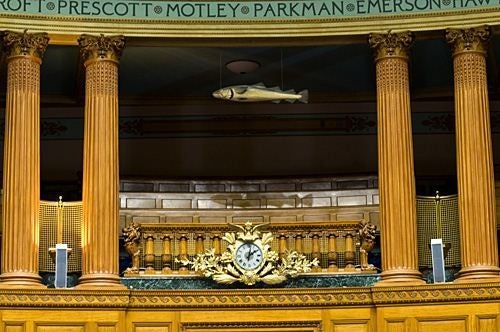Not So Sacred Cod
We must move on habitat protection

This page was published 11 years ago. Find the latest on Earthjustice’s work.
Will we be the last generation to enjoy cod in New England?
Since Colonial times, the Sacred Cod hanging in the Massachusetts State House has been a “historic and continuing symbol of the commonwealth.” This regional mascot reminds us that New England was built on a foundation of fish.
Without drastic intervention to save the cod (and the habitat they need to thrive) our grandchildren might know the cod only as the wooden sculpture – and a testament to our greed and short-sightedness.
This summer, NOAA Fisheries released some shocking new data.
It appears that cod in the Gulf of Maine have declined to just 3 percent of what is needed for a healthy population (down from an already dismal 15 percent in 2011). Worse yet, scientists found fewer juveniles, which means reproduction rates are crashing. Atlantic cod is headed toward “commercial extinction” in New England waters, as happened in Canada in the 1990s.
The decline of cod is the result of bad decisions by federal fisheries managers (under pressure from powerful fishing interests) that encouraged overfishing for decades and failed to protect the habitat cod need to thrive.
In 2012, the New England Fisheries Management Council recommended a significant quota cut for cod in a last-ditch effort to save the species. This was met with outrage by the old-school groundfish industry. NOAA Fisheries, the federal agency who makes the final management decisions, tried to soften the blow – taking actions which were recently found illegal by a Federal Court.
The new science shows that even the 2012 catch reductions were too small to protect the remaining cod stock. More needs to be done.
Despite the scientific evidence, expect the dominant players in the fishery to launch a new-old campaign of outrage against the measures needed to save, and rebuild cod stocks. Their campaign will include familiar messages.
First, they will claim NOAA’s Science Center got the science wrong and that there are far more cod in the ocean than estimated – despite the fact fishermen have been unable to catch even the declining cod quotas in recent years.
They will try to blame other causes for the population decline, like ravenous hoards of seals and dogfish, and climate change, while not acknowledging the severe overfishing that took place for decades.
The industry will also call for more “flexibility” in the regulations that are needed to prevent overfishing and protect the habitat cod need to recover.
Finally, expect a request for more government money to bail them out. This year, U.S. taxpayers gave the New England groundfish industry $33 million.
If the limited areas of the ocean currently closed to protect cod and other bottom-dwelling fish are opened up to try to soften the pain of needed quota cuts for another more year or two, the last remaining aggregations of cod will be harvested. This will ensure the extinction of cod as a commercial resource in New England.
Sadly, NOAA Fisheries and the New England Fisheries Management Council are considering a plan to further reduce habitat protection by as much as 70 percent, eliminating protection in nearly 5,000 sq. miles of oceans – an area the size of Connecticut.
“Don’t do it,” warned former Chairman Rip Cunningham to his colleagues on the New England Fishery Management Council. “These closures are the minimum that should be done, if there is any hope to restore Gulf of Maine cod.”
Everyone knows what needs to be done to give cod a chance to survive.
We do need the more conservative catch quotas. But we also need to protect the habitat where cod feed and reproduce. More than one hundred marine scientists signed a letter to NOAA last year explaining the need to keep the current closed areas protected. We also must expand protected zones to include newly identified areas vital for cod survival.
Protecting habitat creates bigger fish that produce more offspring. Protected areas also “export” fish into the surrounding waters may then be caught as part of the fishery.
Our ancestors believed the Gulf of Maine’s bounty was endless. They declared Atlantic cod “sacred” due to the crucial role this species has played in the economic and cultural development of New England, and to remind us to respect what nature provides for our survival and well-being.
We should do everything we can to honor their wisdom.
Earthjustice’s Oceans Program uses the power of the law to safeguard imperiled marine life, reform fisheries management, stop the expansion of offshore oil and gas drilling, and increase the resiliency of ocean ecosystems to climate change.